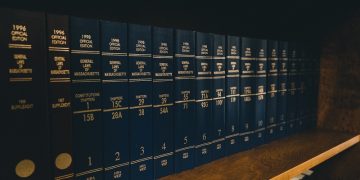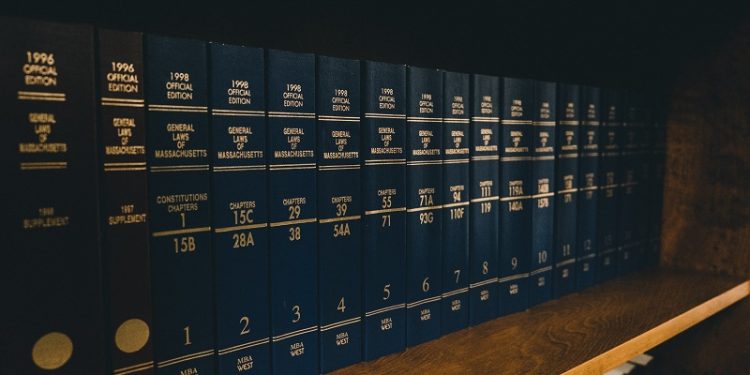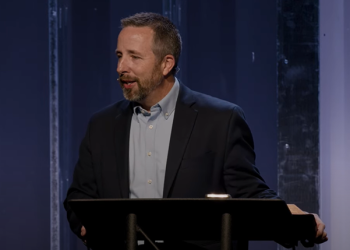I recently joined my fellow Alaskan Tait Zimmerman on an episode of The Lancaster Patriot Podcast entitled “Theonomists in Alaska.” I unapologetically shared the episode around on social media and encouraged those who were close to me to listen to the discussion. I received encouraging feedback, but it became evident after a few conversations that I had failed to use terms and definitions that would be easy to understand. As one listener said, “It became evident very quickly that the speakers on the podcast were much more intelligent than me, and that I didn’t fully understand what was being said.”
While I appreciated the compliment about our intelligence (which in my case, isn’t all that impressive), I felt that we had failed on some level. While everything that was said in the episode is valid and compelling (I believe), if we neglect to make the issue understandable to the everyday Christian, the issue of natural law versus divine law will forever remain stuck within the borders of “Reformed theologian land.” I genuinely want to make this accessible to the common man, because that’s exactly what I am myself.
So, in this follow-up, I’d like to take the time to really break down some of the terms and ideas that were being thrown around and give some context for why this discussion is even taking place.
In the episode, Chris Hume asked me to provide a definition of natural law. As mentioned in the podcast, this can be challenging to do, as there are multiple and various ways someone could define it. This definition can change depending on a person’s worldview, theological background, or even their view of the end times. A person’s view of law is like the wet paint that my toddler walked through, only to leave little blue footprints everywhere else. Natural law toddles through one’s theology, leaving little clues to its presence in other areas.
This is the definition I gave in the episode: A body of moral principles and ethical boundaries that apply to all humanity. Unchangeable, revealed in the nature of things, and the basis for all human contact and interactions.
I will break this down even further and attempt to clarify just what it is that a natural law proponent is saying.
First, natural law is “a body of moral principles and ethical boundaries that apply to all humanity.” In other words, what is right and wrong? This is a body or collection of ideas about what is right and what is wrong. Another way to understand it is in terms of truth. Right and wrong must apply to everyone, just as truth does. If the truth is different tomorrow than it is today, then by definition it isn’t true. Truth is immovable, unbending and solid. So too, is right and wrong. If it is wrong to murder someone, then it must always be wrong, no matter the time, location, or intent. If you could travel to Mars, find a flourishing human civilization and murder one of its citizens, it would still be wrong.
So, what constitutes right and wrong cannot be subject to opinion or whim, it must be a standard that cannot be changed, and it must apply to every member of humanity equally. Someone who claims that it’s okay for Indians to commit theft, but for anyone else it’s wrong, would be violating this universal standard.
Which leads us to “unchangeable, revealed in the nature of things.”
This guideline for what is right and wrong cannot be changed, as shown in the example above. But where does this guideline come from? According to the natural law proponent, it is made evident in “the nature of things.” What does that mean? I will let Thomas Aquinas, a 13th century Dominican friar give his understanding (The term Thomism was mentioned on the podcast as well, it simply means someone who subscribes to the teachings, at least in part, of Thomas Aquinas): “The light of reason is placed by nature in every man to guide him in his acts.”
The natural law, according to Aquinas, has certain basic and self-evident rules or commands, knowable to any human with a properly functioning intellect and a degree of experience in the world. In other words, mankind has something deep-seated within himself, that can be understood, reasoned from, and expounded on to understand and act on those principles of right and wrong. This is why the word conscience is helpful here. Everyone has a conscience, it is built into every human being, because we are all image bearers of God. Animals do not have a conscience; they don’t feel bad when they kill each other. They don’t have a “still small voice” that tells them to love their neighbor as themselves.
This idea of natural law then becomes the basis for all human contact and interactions.
If something is right in a moral sense, then it must be the foundation for how humans interact with each other. It cannot change on a whim, otherwise how someone interacts with you, will also change. While civil law is not always the best example for how things should function, we can still imagine the chaos and loss of life that would ensue if suddenly the law was changed so everyone had to drive on the left side of the road, instead of the right. Then three weeks later the civil government decides to reverse that law. More chaos ensues and more lives are lost. If the principles of right and wrong are not foundational to all human interaction, then we can never be sure what chaos and loss of life will be the result.
In summary, the natural law theorist believes that the guiding principles of right and wrong, come from something placed within man’s nature (by God), and that mankind can understand these principles through reason and logic. These principles are binding on all humans, and are the foundation for how mankind interacts with each other.
At the end of the day, the theonomist (proponent of God’s Law) agrees with the natural law proponent on many things. True, law must be unchanging. It must be universal in scope (applies to everyone, regardless of religion, age, location, intelligence, etc.) and it must be basic and foundational to how one man interacts with another.
The difference is the source of law. This is why the discussion is so important, and the conversation must continue. The source of law is of the utmost importance: Does it come from within man’s conscience? Or does it come from divine revelation? That is where the debate lies.
The natural law theorist is correct on the importance and necessity of a standard of right and wrong. We agree on the value of understanding the ways in which mankind interacts with each other. We even agree on the content most of the time (though not always). However, we strongly disagree about where law comes from.
If we say the source of law is man’s reasoning, then there is no objective standard to which we can appeal. Imagine, for a moment, if we wrote down the “law” (what is right and wrong, what should happen to thieves, etc.) as five different natural law proponents understand it. Would those written expressions of the “natural law” be the same? Unlikely. And to what would we compare those laws if we wanted to judge them? To another man’s reasoning? There is no finality, no resting place, when it comes to natural law. However, the Scripture is settled. It is the standard to which we subject our opinions. In the words of the confession, the “Supreme Judge, by which all controversies of religion are to be determined, and all decrees of councils, opinions of ancient writers, doctrines of men, and private spirits, are to be examined, and in whose sentence we are to rest, can be no other but the Holy Spirit speaking in the Scripture.” The divine law, revealed in Scripture, is where “we are to rest.”
Relying on natural law and man’s reason (as we argued in “Theonomists in Alaska”) is insufficient for moral guidance. It may be helpful, but it’s not enough. Instead, we desire to see all people turn to the divine word of God for guidance in all aspects of their life: family, church, individual, business, and civil. As Tait Zimmerman said in the episode, the Bible is more than a church book to be relegated only to the realm of personal piety. We believe that the Bible is the standard by which all men everywhere must seek guidance concerning what God says is right and wrong.
I hope that I’ve been able to break down the idea of natural law in a way that is more understandable. If you had difficulty following what was said in that episode of the Lancaster Patriot, maybe read this article and try listening again, hopefully it will make more sense.

Josiah Huestis
Josiah Huestis serves as a deacon at Whale Pass Bible Church and sits on the city council of a small Alaskan town. Josiah lives with his wife and seven children on Prince of Wales Island. He can be reached at family4theking@protonmail.com.






























